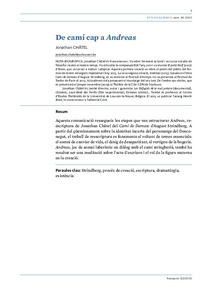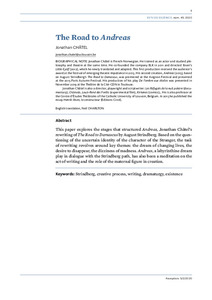| dc.contributor.author | Châtel, Jonathan | |
| dc.date.accessioned | 2021-01-28T08:37:45Z | |
| dc.date.available | 2021-01-28T08:37:45Z | |
| dc.date.issued | 2020 | |
| dc.identifier.issn | 2385-362X | |
| dc.identifier.issn | 0212-3819 | |
| dc.identifier.uri | http://hdl.handle.net/20.500.11904/1180 | |
| dc.description.abstract | <p><strong></strong>This paper explores the stages that structured <em>Andreas</em>, Jonathan Châtel’s rewriting of <em>The Road to Damascus </em>by August Strindberg. Based on the questioning of the uncertain identity of the character of the Stranger, the task of rewriting revolves around key themes: the dream of changing lives, the desire to disappear, the dizziness of madness. <em>Andreas</em>, a labyrinthine dream play in dialogue with the Strindberg path, has also been a meditation on the act of writing and the role of the maternal figure in creation. </p> | |
| dc.description.abstract | <p>Aquesta comunicació ressegueix les etapes que van estructurar <em>Andreas</em>, reescriptura de Jonathan Châtel del <em>Camí de Damasc </em>d’August Strindberg. A partir del qüestionament sobre la identitat incerta del personatge del Desconegut, el treball de reescriptura es fonamenta al voltant de temes essencials: el somni de canviar de vida, el desig de desaparèixer, el vertigen de la bogeria. <em>Andreas</em>, joc de somni laberíntic en diàleg amb el camí stringberià, també ha resultat ser una meditació sobre l'acte d'escriure i el rol de la figura materna en la creació.</p> | |
| dc.relation.ispartof | Estudis escènics: quaderns de l'Institut del Teatre. 2020, Núm. 45 | |
| dc.title | De camí cap a «Andreas» | |
| dc.type | Article | |
| dc.date.updated | 2021-01-28T08:37:46Z | |
| dc.rights.access | Open Access | |



